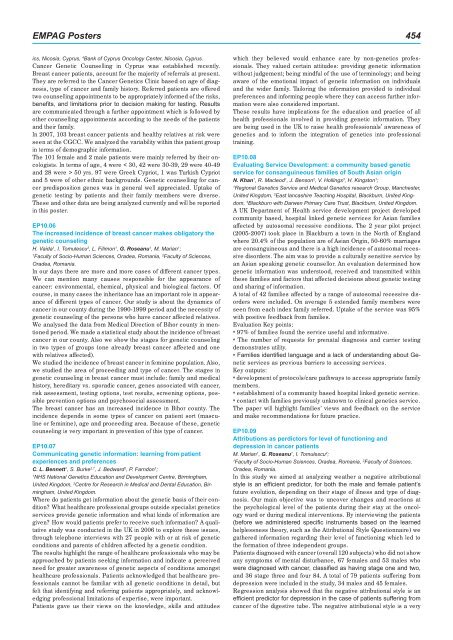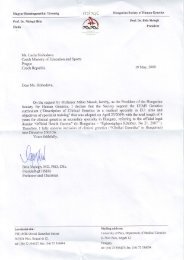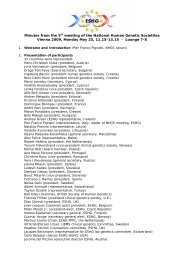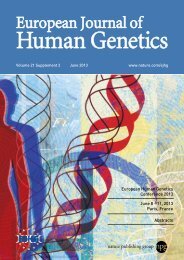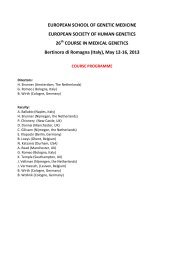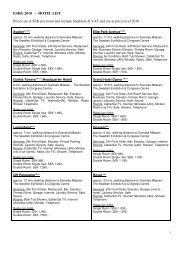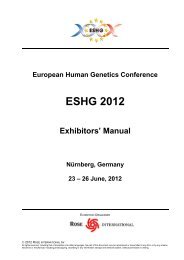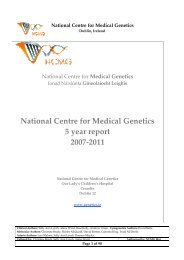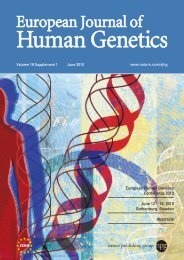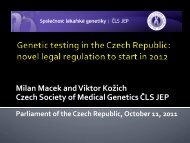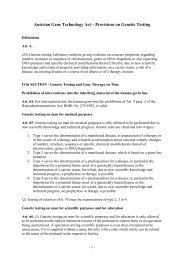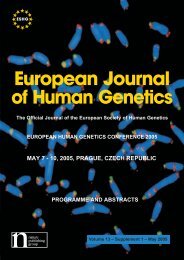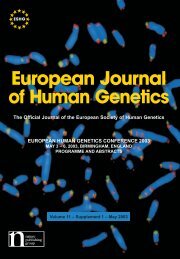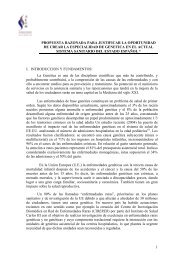2008 Barcelona - European Society of Human Genetics
2008 Barcelona - European Society of Human Genetics
2008 Barcelona - European Society of Human Genetics
You also want an ePaper? Increase the reach of your titles
YUMPU automatically turns print PDFs into web optimized ePapers that Google loves.
EMPAG Posters<br />
ics, Nicosia, Cyprus, 4 Bank <strong>of</strong> Cyprus Oncology Center, Nicosia, Cyprus.<br />
Cancer Genetic Counselling in Cyprus was established recently .<br />
Breast cancer patients, account for the majority <strong>of</strong> referrals at present .<br />
They are referred to the Cancer <strong>Genetics</strong> Clinic based on age <strong>of</strong> diagnosis,<br />
type <strong>of</strong> cancer and family history . Referred patients are <strong>of</strong>fered<br />
two counselling appointments to be appropriately informed <strong>of</strong> the risks,<br />
benefits, and limitations prior to decision making for testing. Results<br />
are communicated through a further appointment which is followed by<br />
other counselling appointments according to the needs <strong>of</strong> the patients<br />
and their family .<br />
In 2007, 103 breast cancer patients and healthy relatives at risk were<br />
seen at the CGCC . We analyzed the variability within this patient group<br />
in terms <strong>of</strong> demographic information .<br />
The 101 female and 2 male patients were mainly referred by their oncologists<br />
. In terms <strong>of</strong> age, 4 were < 30, 42 were 30-39, 29 were 40-49<br />
and 28 were > 50 yrs . 97 were Greek Cypriot, 1 was Turkish Cypriot<br />
and 5 were <strong>of</strong> other ethnic backgrounds . Genetic counselling for cancer<br />
predisposition genes was in general well appreciated . Uptake <strong>of</strong><br />
genetic testing by patients and their family members were diverse .<br />
These and other data are being analyzed currently and will be reported<br />
in this poster .<br />
EP10.06<br />
the increased incidence <strong>of</strong> breast cancer makes obligatory the<br />
genetic counseling<br />
H. Vaida1 , I. Tomulescu2 , L. Filimon1 , G. Roseanu1 , M. Marian1 ;<br />
1 2 Faculty <strong>of</strong> Socio-<strong>Human</strong> Sciences, Oradea, Romania, Faculty <strong>of</strong> Sciences,<br />
Oradea, Romania.<br />
In our days there are more and more cases <strong>of</strong> different cancer types .<br />
We can mention many causes responsible for the appearance <strong>of</strong><br />
cancer: environmental, chemical, physical and biological factors . Of<br />
course, in many cases the inheritance has an important role in appearance<br />
<strong>of</strong> different types <strong>of</strong> cancer . Our study is about the dynamics <strong>of</strong><br />
cancer in our county during the 1990-1999 period and the necessity <strong>of</strong><br />
genetic counseling <strong>of</strong> the persons who have cancer affected relatives .<br />
We analysed the data from Medical Direction <strong>of</strong> Bihor county in mentioned<br />
period . We made a statistical study about the incidence <strong>of</strong> breast<br />
cancer in our county . Also we show the stages for genetic counseling<br />
in two types <strong>of</strong> groups (one already breast cancer affected and one<br />
with relatives affected) .<br />
We studied the incidence <strong>of</strong> breast cancer in feminine population . Also,<br />
we studied the area <strong>of</strong> proceeding and type <strong>of</strong> cancer . The stages in<br />
genetic counseling in breast cancer must include: family and medical<br />
history, hereditary vs . sporadic cancer, genes associated with cancer,<br />
risk assessment, testing options, test results, screening options, possible<br />
prevention options and psychosocial assessment .<br />
The breast cancer has an increased incidence in Bihor county . The<br />
incidence depends in some types <strong>of</strong> cancer on patient sort (masculine<br />
or feminine), age and proceeding area . Because <strong>of</strong> these, genetic<br />
counseling is very important in prevention <strong>of</strong> this type <strong>of</strong> cancer .<br />
EP10.07<br />
communicating genetic information: learning from patient<br />
experiences and preferences<br />
C. L. Bennett 1 , S. Burke 2,1 , J. Bedward 2 , P. Farndon 1 ;<br />
1 NHS National <strong>Genetics</strong> Education and Development Centre, Birmingham,<br />
United Kingdom, 2 Centre for Research in Medical and Dental Education, Birmingham,<br />
United Kingdom.<br />
Where do patients get information about the genetic basis <strong>of</strong> their condition?<br />
What healthcare pr<strong>of</strong>essional groups outside specialist genetics<br />
services provide genetic information and what kinds <strong>of</strong> information are<br />
given? How would patients prefer to receive such information? A qualitative<br />
study was conducted in the UK in 2006 to explore these issues,<br />
through telephone interviews with 27 people with or at risk <strong>of</strong> genetic<br />
conditions and parents <strong>of</strong> children affected by a genetic condition .<br />
The results highlight the range <strong>of</strong> healthcare pr<strong>of</strong>essionals who may be<br />
approached by patients seeking information and indicate a perceived<br />
need for greater awareness <strong>of</strong> genetic aspects <strong>of</strong> conditions amongst<br />
healthcare pr<strong>of</strong>essionals . Patients acknowledged that healthcare pr<strong>of</strong>essionals<br />
cannot be familiar with all genetic conditions in detail, but<br />
felt that identifying and referring patients appropriately, and acknowledging<br />
pr<strong>of</strong>essional limitations <strong>of</strong> expertise, were important .<br />
Patients gave us their views on the knowledge, skills and attitudes<br />
which they believed would enhance care by non-genetics pr<strong>of</strong>essionals<br />
. They valued certain attitudes: providing genetic information<br />
without judgement; being mindful <strong>of</strong> the use <strong>of</strong> terminology; and being<br />
aware <strong>of</strong> the emotional impact <strong>of</strong> genetic information on individuals<br />
and the wider family . Tailoring the information provided to individual<br />
preferences and informing people where they can access further information<br />
were also considered important .<br />
These results have implications for the education and practice <strong>of</strong> all<br />
health pr<strong>of</strong>essionals involved in providing genetic information . They<br />
are being used in the UK to raise health pr<strong>of</strong>essionals’ awareness <strong>of</strong><br />
genetics and to inform the integration <strong>of</strong> genetics into pr<strong>of</strong>essional<br />
training .<br />
EP10.08<br />
Evaluating service Development: a community based genetic<br />
service for consanguineous families <strong>of</strong> south Asian origin<br />
N. Khan 1 , R. Macleod 1 , J. Benson 2 , V. Hollings 3 , H. Kingston 1 ;<br />
1 Regional <strong>Genetics</strong> Service and Medical <strong>Genetics</strong> research Group, Manchester,<br />
United Kingdom, 2 East lancashire Teaching Hospital, Blackburn, United Kingdom,<br />
3 Blackburn with Darwen Primary Care Trust, Blackburn, United Kingdom.<br />
A UK Department <strong>of</strong> Health service development project developed<br />
community based, hospital linked genetic services for Asian families<br />
affected by autosomal recessive conditions . The 2 year pilot project<br />
(2005-2007) took place in Blackburn a town in the North <strong>of</strong> England<br />
where 20 .4% <strong>of</strong> the population are <strong>of</strong> Asian Origin, 50-60% marriages<br />
are consanguineous and there is a high incidence <strong>of</strong> autosomal recessive<br />
disorders . The aim was to provide a culturally sensitive service by<br />
an Asian speaking genetic counsellor . An evaluation determined how<br />
genetic information was understood, received and transmitted within<br />
these families and factors that affected decisions about genetic testing<br />
and sharing <strong>of</strong> information .<br />
A total <strong>of</strong> 42 families affected by a range <strong>of</strong> autosomal recessive disorders<br />
were included . On average 5 extended family members were<br />
seen from each index family referred . Uptake <strong>of</strong> the service was 95%<br />
with positive feedback from families .<br />
Evaluation Key points:<br />
• 97% <strong>of</strong> families found the service useful and informative .<br />
• The number <strong>of</strong> requests for prenatal diagnosis and carrier testing<br />
demonstrates utility .<br />
• Families identified language and a lack <strong>of</strong> understanding about Genetic<br />
services as previous barriers to accessing services .<br />
Key outputs:<br />
• development <strong>of</strong> protocols/care pathways to access appropriate family<br />
members .<br />
• establishment <strong>of</strong> a community based hospital linked genetic service .<br />
• contact with families previously unknown to clinical genetics service .<br />
The paper will highlight families’ views and feedback on the service<br />
and make recommendations for future practice .<br />
EP10.09<br />
Attributions as perdictors for level <strong>of</strong> functioning and<br />
depression in cancer patients<br />
M. Marian1 , G. Roseanu1 , I. Tomulescu2 ;<br />
1 2 Faculty <strong>of</strong> Socio-<strong>Human</strong> Sciences, Oradea, Romania, Faculty <strong>of</strong> Sciences,<br />
Oradea, Romania.<br />
In this study we aimed at analyzing weather a negative attributional<br />
style is an efficient predictor, for both the male and female patient’s<br />
future evolution, depending on their stage <strong>of</strong> illness and type <strong>of</strong> diagnosis<br />
. Our main objective was to uncover changes and reactions at<br />
the psychological level <strong>of</strong> the patients during their stay at the oncology<br />
ward or during medical interventions . By interviewing the patients<br />
(before we administered specific instruments based on the learned<br />
helplessness theory, such as the Attributional Style Questionnaire) we<br />
gathered information regarding their level <strong>of</strong> functioning which led to<br />
the formation <strong>of</strong> three independent groups .<br />
Patients diagnosed with cancer (overall 120 subjects) who did not show<br />
any symptoms <strong>of</strong> mental disturbance, 67 females and 53 males who<br />
were diagnosed with cancer, classified as having stage one and two,<br />
and 36 stage three and four 84 . A total <strong>of</strong> 79 patients suffering from<br />
depression were included in the study, 34 males and 45 females .<br />
Regression analysis showed that the negative attributional style is an<br />
efficient predictor for depression in the case <strong>of</strong> patients suffering from<br />
cancer <strong>of</strong> the digestive tube . The negative attributional style is a very


